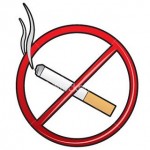Researchers have observed that following taking up exercise while trying to quit smoking is extremely beneficial. Physical activities increase your chances of being a successful quitter.
If you are a beginner and have not been exercising regularly, you don’t need to get nervous about the strenuous physical activity. Even a five minute walk or moderate stretches would be helpful. More intense and longer exercise sessions aren’t necessary but help more. Gradually you could go on to develop a full fledged exercise routine depending on how your body responds.
Due to smoking cigarettes, the capacity of your lungs decreases over a period of time. Hence, you will find yourself out of breath very quickly if you exercise too hard too soon. Bear in mind you’re better off taking it easier early on rather than ‘going for it’ straight away, to reap maximum benefits. 
It can take up to nine months for coughs, wheezing and breathing problems to show any great improvement, after you quit smoking. Make it your aim to get fit by maintaining a steady progressive exercise program over a period of 6 weeks. With time your lungs will have relaxed and your circulation will have improved. Be persistent and stick to the regime even if you do not see the results within a week or two.
Seek advice from your doctor before starting any type of fitness program, if you have a history of coronary heart disease. It would also be helpful if you have not followed an exercise regime in a long time.
Keep in mind that due to smoking your lungs and blood circulation have deteriorated, and hence you need to take it easy. Listen to your body when you are trying to determine the level of your physical activity. Exercises which your body cannot handle would do more harem than good. Let us take a look at a ‘Talk test’ which is recommended by http://www.quit.org.uk/.
• If you can hold a full-blown conversation while training, then you’re probably not working out hard enough. However, if you’re unable to talk then you’re probably trying too hard. So try to pitch your workout intensity somewhere between the two.
After determining the level of exercises that your body can handle, you also need to focus on other areas. Start with a warm up session. It would improve your blood circulation and the exercises would be more beneficial. If, you feel that your body is stiff then go ahead and do some stretches as well. However, it is essential to stretch your muscles after you have worked out as part of your cooling down process. Emphasize more on the stretches that you do after the exercises. Hold them at least for 30 seconds. The stretches that you do after the warm up could be held for up to 15 seconds.
Benefits of working out:
• As you exercise while you stop the daily dose of nicotine, your lungs will get stronger. The levels of carbon monoxide in your body will reduce and the oxygen supply of to the body will increase. You will no longer experience fatigue and stress. Almost 70% of the oxygen is supplied to the brain.
• Exercises reduce cigarette cravings to a great extent. They stimulate the brain to secrete ‘feel good’ hormones and thus reduce stress. Staying away from stress will reduce the nicotine pangs, as most smokers light up when they are under some sort of stress.
• Nicotine acts as a nicotine suppressant. It reduces your metabolism to a great extent. Hence, smokers tend to lose weight. However, when you plan to quit you have to remember that the body would not get nicotine anymore. Your body would also respond better to the fragrances and tastes of food. This would make food more appealing and you tend to eat more. 30 minutes of moderate exercises of your choice would be really useful in keeping the excess weight off.


